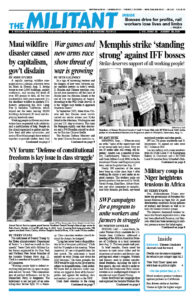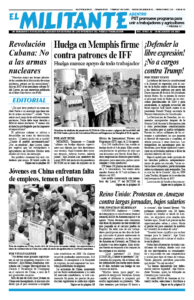Gen. Abdourahmane Tchiani overthrew the government of President Mohamed Bazoum in Niger July 26, amid deteriorating conditions facing millions of workers and farmers as well as attacks by Islamist terrorist groups.
The takeover sharpened tensions between the French imperialist rulers, who had been allied with Bazoum, and Moscow, which has been increasing its military presence across the Sahel region.
Neighboring capitalist powers, backed by Washington, threaten to intervene to overturn the coup.
Tchiani dissolved Niger’s Constitution and suspended the former government. His military regime says it will prosecute Bazoum for treason, based on his relations with foreign governments.
Paris, the former colonial ruler, has 1,500 troops in Niger, the largest contingent of the 5,650 troops it deploys in Africa. Niger’s substantial uranium deposits are key for France’s nuclear power plants, which produce most of the country’s electricity. Paris also exports power to Germany, which cut off its imports of gas from Russia after Putin’s invasion of Ukraine.
Washington has two military bases and 1,100 troops in Niger. Prior to the coup, they had been training and advising Bazoum’s special forces. The Pentagon has unleashed drone strikes on Libya from Niger and mounted surveillance operations in the region.
The rulers in both Paris and Washington have spent years intervening in the Sahel, a region of western and north-central Africa below the Sahara, pursuing their own separate imperialist interests. Both justify their presence as attempts to stop Islamist forces, which have taken over vast swathes of land in Mali and elsewhere, forcing millions to flee their homes. Neither has had much success. Last year the U.S. State Department described Niger as a “lynchpin of stability in the Sahel” after coups in Mali and Burkina Faso led to the ouster of French troops and openings for Moscow.
Coup leaders in Niger announced an end to military agreements with the French government. The failure of French forces to stem Islamist terror groups’ incursions from Mali deepened hostility toward Paris among working people in both countries. Tchiani also halted joint military exercises with the U.S.
Thousands demonstrated Aug. 11 near a French military base in Niamey, Niger’s capital, chanting “Down with France! Down with ECOWAS!” The Economic Community of West African States is a bloc of 15 nations threatening military intervention to overturn the coup. It is headed by the rulers of Nigeria, who are allied with Washington.
The new rulers in Niger, along with coup leaders in Burkina Faso and Mali, posture as anti-imperialist fighters to garner support.
Since the coup, Paris and Washington have suspended financial assistance to Niger. Nearly half the country’s budget comes from foreign aid. For decades the rulers in Niger have used the CFA franc, a currency set up and controlled by the French government, to aid its domination and plunder of the region. Fourteen African governments rely on the CFA franc.
For working people in Niger, the political turmoil comes on top of economic destitution and increasing threats from the Islamist forces. Most are subsistence farmers with small landholdings, coping with frequent droughts. Some 21 million out of a population of 25 million have no access to electricity. Basic sanitary facilities are available to only 13% of the population in rural areas. High prices and food shortages are exacerbated by today’s crisis of capitalism worldwide.
For both Niger’s capitalist rulers and their longtime allies in Paris and more recently Washington, the coup has sharpened competition over control of the country’s mineral resources and potentially vast profits. Niger has large deposits of coal, oil and gold. Chinese capitalists are also exploiting Niger’s oil and uranium, and Beijing is building an oil pipeline in the southeast.
Moscow intervenes across region
Russian President Vladimir Putin is pushing to expand Moscow’s influence, trade and military presence in the region, taking advantage of the growing difficulties faced by Paris and Washington. Tensions between Washington and Moscow have increased since Putin’s invasion of Ukraine and the punishing sanctions imposed by Washington and its allies on Russia. Pressures toward new wars are growing.
Putin had deployed Wagner mercenaries in conflicts across Africa since 2017. Today they operate in Mali and Libya, which border Niger, and in the Central African Republic and Sudan.
Wagner chief Yevgeny Prigozhin hailed the coup as a victory in the battle “of the people of Niger with their colonizers.” He hopes the coup will lead to openings to expand Wagner’s reach in the Sahel.
Shortly after announcing his military forces would no longer permit Ukrainian grain shipments to Africa and one day after the coup, Putin hosted a meeting with African heads of state in St. Petersburg. He promised some Russian grain and military aid in exchange for political support for his regime’s murderous war against Ukraine. Prigozhin also attended, meeting with participants on the sidelines.
The Russian foreign ministry condemned threats by ECOWAS leaders to invade Niger.
After the coup, governments in ECOWAS imposed sanctions on Niger, making life harder for working people there. People living near Niger’s border with Nigeria depend on cross-border trade for most basic necessities. The Nigerian government has cut its power supply to Niger, the source of 70% of its electricity.
While ECOWAS nations have yet to invade, their forces remain on standby. The military-led governments in Mali and Burkina Faso condemned ECOWAS leaders’ threats to invade, pledging to assist Niger’s new rulers.

